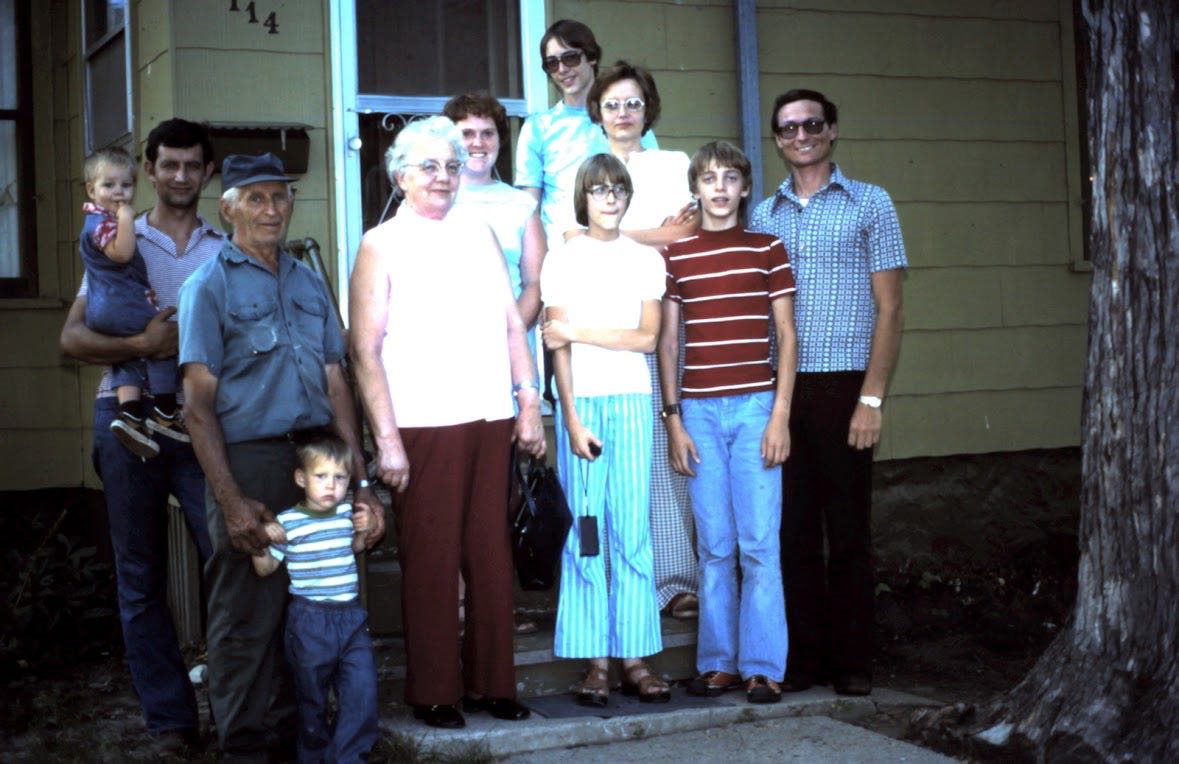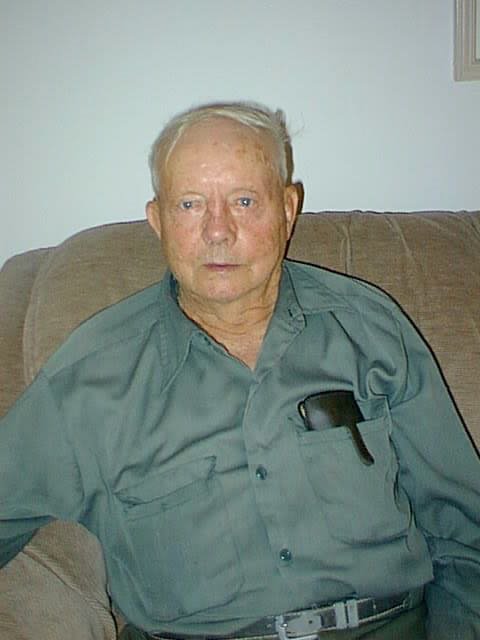18 More Relatives
My father was blessed with dozens of cousins thanks to the prolific mating habits of his grandfather and uncles. But we knew few if any of them, and fewer of whatever children were my age. Partly this was a consequence of distance – they were scattered in California, Colorado, Oklahoma – but honestly a bigger reason was a lack of cohesion on that side of the family. “We’re the white sheep of the Sprague family”, we joked.
My great-grandfather, Howard and his wife Delia had seven children: Buren, Don, Art, Lyle, Avanell, Loretta, and Dewey.
Although I probably met each of them at some long-forgotten family gathering, I don’t remember much. Mostly they were just names to me, old people who were somehow connected with the Sprague side.
Art was an exception. He and his wife Doris lived a mile down the road from Grandma’s house – at least when I was very young – a place I remember full of stories of the practical jokes that the couple liked to play on others – and each other.
Their son Kenny, who was several years older than me, might have become a cousin friend but sometime in the early 1970s they moved to Kenosha, in southern Wisconsin, when Doris got a job at a car manufacturing plant.
Other sons of Howard were scattered across the country, and I know little of them except for family stories.
Howard objected when his daughter Loretta wanted to marry her teenage boyfriend, Harold. But somehow they married anyway, a relationship that lasted a lifetime. They lived in Lansing Michigan.
Most of these people carried the Sprague name, and I don’t doubt that if I ever spent time in Eureka California I would bump into descendants, legitimate and otherwise, of Howard’s son Dewey, who married multiple times and had many children and then grandchildren.
18.1 Paul and Pat Pulokas
We knew the Pulokas side of the family much better. My mother’s only sibling, Paul, was three years younger than she was, and having moved away from home while he was just beginning high school, she might be expected to not know him very well. But sometime after college, he met and then married Pat Henschel, a part-time registered nurse and family powerhouse.
She met Paul at a bar in November 1966, when she bumped into him on purpose as a way to strike up a conversation. They were college seniors at the time – she in her last year of nursing school, he in his final (fifth) year in agricultural engineering. They dated a lot after that, and by graduation in the summer of 1968, they were essentially engaged. He started a new job at International Harvester, but within six months he received his draft notice and soon was headed to Fort Dietrich Maryland for the next two years.
They corresponded by mail nearly every day and the following year he got her a ring and brought her to the farm to meet his parents. Her mother was strongly opposed to her marrying a Catholic, so it took another many months to work that out. Finally in 1969, she moved to Maryland, got a job at a hospital and an apartment there so they could see each other every weekend. They married in 1969.
It never seemed odd to us that Paul wasn’t much of a talker. Like his father (my grandfather), he was married to somebody who was far more conversational, so perhaps these Pulokas men simply never bothered to speak much to us. What would be the point, since their wives knew everything and kept everyone in touch anyway?
My earliest memory of Paul is from a hotel room near Madison Wisconsin, where we stayed while attending his wedding. I vaguely remember a long reception, with loud music and dancing that I thought overly boring. A much more exciting event at the time was the cartoon “Underdog” playing on our hotel room TV set. I also vaguely remember my brother being ill, perhaps from the abundant food.
Sometime a few years later, we visited Pat and Paul at their home in Bloomington Illinois to meet their first child, Tony Pulokas, my first cousin. It was a six hour drive that we could afford to undertake only on special occasions, like summer vacations. For Christmas or Thanksgiving, they would drive up north to meet us.
More children, and more cousins, arrived throughout the 1970s, eventually giving me four first cousins: Tony, Mark, Jim, and finally Katie (born in 1980). Because of the distance, we saw them at most once or twice a year. The boys were several years younger than we were – a difference that matters more at that age – so although I have pleasant memories of our yearly visits, we didn’t know each other as well as many families.

18.2 Uncle Raymond
Raymond was born to Herman and Mary Faerber in McKinley Wisconsin. He was baptized into the Christian faith on January 7, 1921 by the Rev. A. F. Hemer at Jump River, Wisconsin. His sponsors were Ella Beutler, Reinhold Luedke and Frank Beutler. On July 2, 1933, he was confirmed into the Christian faith at Trinity Lutheran Church, Sheldon Wisconsin by the Rev. O.H. Marten.
On October 27, 1942, Raymond entered into active military service with the United States Army. He took part in battle and campaigns in the vicinity of Rome – arno, the Northern Appennines and Po Valley. He was awarded the Good Conduct Medal, the American Theater Service Medal, the European-African-Middle Easter Theater Service Medal and Two Overseas Service Bars. His rank was Private First Class.
Raymond passed away at Rusk County Memorial Nursing Home on Monday January 27, 1998 at the age of 79 years, 11 months and 1 day.
He was preceded in death by one brother, Reuben.
February 25, 1918 - January 26, 1998
Buried in Mt. Nebo Cemetery in Jump River, Wisconsin
My grandmother’s brother, Raymond, fought in Italy during World War II, and that seemed to be his favorite topic conversation ever since. Not the war, per se, but his observations about sinfulness and how small temptations could grow into bigger ones.
His sister, my grandmother Ruth, was only daughter in a family rocked by devastating tragedy. Their father (my great-grandfather Herman Faerber) had lost his left arm in an accident (sawing wood?) early in his life — I’m not clear whether it happened before or after his marriage.
Maybe it’s understandable that everyone in that family spent time in mental institutions (including my grandmother, of which I’ll discuss later). The eldest brother, Buren, had already been long institutionalized by the time my parents married, apparently coming to believe that he was God himself — on the only time he was introduced to my mother, he refused to shake with his right hand because “I’m holding the world in it”.
Their mother, Marie, died when Ruth was only 18 years old, of breast cancer, after what was no doubt a long bout of unspeakable pain and suffering. The mother and daughter were apparently quite close, so I’m sure it made a devastating impression on my grandmother, though it never occurred to us to ask the details.
Marie was, we were told, from a “rich” family in North Dakota and looked down on her husband Herman, who dragged her away from her happy family to live in an unsettled part of northern Wisconsin, near the Jump River, where somehow they had secured some land for farming. The family arrived in an ox cart (or so I’m told), amid forests so thick they had to secure permission from the county to graze their cow in a public park while they cleared their own property.
They spent their first Wisconsin winter on a dirt floor in a shelter barely worthy to be called a shack. The “real” house they built in the Spring became Raymond home for the rest of his life, except that brief period during the war. The property was situated near a river, but for daily use they dug an artisan well in the winter: one foot per day until they struck water at something like 30 feet.
I knew Raymond as a regular guest at Thanksgivings and Christmases, when you could reliably assume he would repeat his many stories of military service in Italy. As with many WW2 veterans in my experience, if he had seen action he didn’t discuss it. Rather, he regaled us with anecdotes of the depravity of his fellow soldiers, some of whom — the horror! — played blackjack.
Still, he was always friendly enough that it was easy to forgive his orneriness as a symptom of being a lifelong bachelor. Grandma would later chide him for “not marrying that Mennonite girl” when he had the chance, a woman who, I heard, remained unmarried herself.

My new wife and I visited Raymond in the mid-1990s, not too long before he passed away. His house was spartan, though I remember it being much cleaner than the bachelor home of my other great-uncles — the Pulokas brothers Joe and Walter, who had never learned to clean up after their mother died. Raymond kept himself busy growing a large garden, and tending to his main prize: an elaborate grove of maple syrup trees, carefully rigged with tap lines that carried the sap automatically to an endpoint where he would boil it into dozens, maybe hundreds of jars of maple syrup each spring.
Although — perhaps because — he lived alone for so long, Raymond was a fiercely religious Lutheran who read the Bible regularly. Few things brought out a livelier side of him than a discussion about non-King James Version translations. I remember a lengthy lecture once about how the modern translators have deliberately inserted some heresy into various verses, the details of which I no longer recall, but which to him seemed of urgent importance.
He wrote notes on what he read, written in the smallest possible handwriting, edge to edge on whatever scraps of paper he could procure. After his death, the family found hundreds and hundreds of these scrupulously-written page of commentary scattered throughout the house.
Raymond and my grandmother had an older brother, Buren, who I never met. Well that’s not quite true. I was a few weeks old when, in April 1963, my mother carried me to the funeral of their remaining parent, Herman Faerber, my great-grandfather. When my mother met Buren there, he apologized that he could not shake her hand. “I’m God”, he explained, “and I need to hold the world in that hand”.
I know very little else about Buren. I dimly remember sitting in a car outside a mental institution in Owen Wisconsin, waiting on my father who had stopped in to visit. Buren was apparently quite intelligent, able to recall details of a newspaper after a brief skim. It was never explained to us how he was institutionalized. It’s one of those family mysteries that was probably so traumatic that at the time nobody wanted to discuss it further. Eventually, enough years passed that it became permissible to talk, gently, about the details, but by then, most of those who knew the facts were gone.